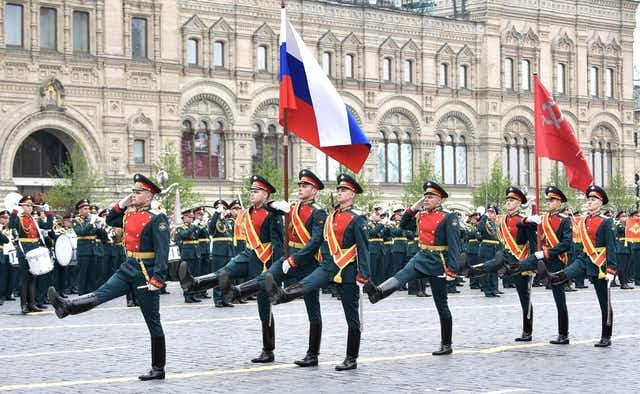Vehicles will march through Moscow’s Red Square, while fighter jets roar overhead as part of the annual Victory Day parade in Russia.
This day of pride, which will mark the 77th anniversary of the Soviet Union’s victory over Nazi Germany in World War II, is seen by some observers as a propaganda tool for President Vladimir Putin’s government, which is drawing on history for its ongoing invasion of Ukraine.
And some fear that Putin will use this year’s celebratory occasion to ramp up war efforts.
“Victory in World War II became the defining myth in post-war Soviet life, outstripping even the Revolution in its significance,” explained Stephen Norris, professor of Russian history at the University of Miami.
“Twenty-seven million Soviet citizens died during the war, and victory obviously came at a great cost. It also validated the sacrifices made during the war. Nobel-Prize-winning author Svetlana Alexievich has captured this well, by stating the history of victory replaced the history of the actual war.”
As Victory Day approaches, some observers believe that the top brass, frustrated at the lack of progress in subduing Ukraine, will call for a push, and Putin will declare total war.
“Putin and his advisers certainly pay attention to historical anniversaries and like to use them to bolster their hold on power,” Norris said. “Given how important Victory Day has been to Putin and Putinism, it’s hard to imagine that his government won’t try to use it for some purpose. It’s hard to see any sort of victory being declared. Instead, my fear is that Putin will use the holiday to announce a new offensive and new phase of the war.”
Some also worry that Putin may announce a mass mobilisation, calling able-bodied men into service. However, earlier rumours of martial law and conscription in March proved to be wrong.
“It’s hard to do a general conscription:: I think that that’s when Russians would come out and protest,” said Elizabeth Wood, professor of history at MIT.
“You can conscript all those people in Buryatia (a mountainous region in Siberia), but if you conscript Muscovites, they’ll protest. I don’t think he can declare victory, either. I think they’re planning a long slogging war.”
Victory Day was first celebrated in 1965 under Soviet leader Leonid Brezhnev, a veteran of the war himself.
Aljazeera









